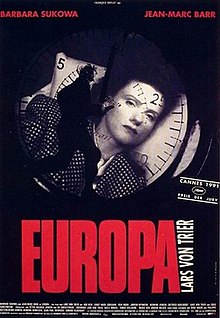Europa (1991 film)
| Europa | |
|---|---|
 Film poster | |
| Directed by | Lars von Trier |
| Written by |
|
| Produced by |
|
| Starring |
|
| Cinematography |
|
| Edited by | Hervé Schneid |
| Music by | Joachim Holbek |
Production companies |
|
| Distributed by | Nordisk Film Biografdistribution |
Release dates | |
Running time | 114 minutes[3] |
| Countries |
|
| Languages |
|
| Budget |
|
| Box office | $1 million[4] |
Europa (known as Zentropa in North America) is a 1991 political drama art film directed by Lars von Trier. It is von Trier's third theatrical feature film and the final film in his Europa trilogy following The Element of Crime (1984) and Epidemic (1987).[5]
The film features an international ensemble cast, including French-American Jean-Marc Barr, Germans Barbara Sukowa and Udo Kier, expatriate American Eddie Constantine, and Swedes Max von Sydow and Ernst-Hugo Järegård.
Europa was influenced by Franz Kafka's Amerika, and the title was chosen "as an echo" of that novel.[6]
Plot[]
A young, idealistic American hopes to "show some kindness" to the German people soon after the end of World War II. In US-occupied Germany, he takes on work as a sleeping-car conductor for the Zentropa railway network, falls in love with a femme fatale, and becomes embroiled in a pro-Nazi terrorist conspiracy.
Cast[]
- Max von Sydow as the Narrator
- Jean-Marc Barr as Leopold Kessler
- Barbara Sukowa as Katharina Hartmann
- Udo Kier as Lawrence Hartmann
- Ernst-Hugo Järegård as Uncle Kessler
- Henning Jensen as Siggy
- Erik Mørk as Pater
- Eddie Constantine as Colonel Harris
- Jørgen Reenberg as Max Hartmann
- Benny Poulsen as Steleman
- Erno Müller as Heifer
- Michael Phillip Simpson as Robins
- Holger Perfort as Mr. Ravenstein
- Anne Werner Thomsen as Mrs. Ravenstein
- Lars von Trier as Jew
- Baard Owe as Man with papers
Style[]

Europa employs an experimental style of cinema, combining largely black and white visuals with occasional intrusions of colour, having actors interact with rear-projected footage, and layering different images over one another to surreal effect. The voice-over narration uses an unconventional second-person narrative imitative of a hypnotist (e.g. "On the count of ten, you will be in Europa.").
The film's characters, music, dialogue, and plot are self-consciously melodramatic and ironically imitative of film noir conventions.
Production[]
The film was shot throughout Poland (Chojna Cathedral (Marienkirche) and the Chojna Roundhouse) and in Denmark (Nordisk Film studios, Copenhagen and the Copenhagen Dansk Hydraulisk Institut)
Von Trier's production company, Zentropa Entertainments, is named after the sinister railway network featured in this film, which is in turn named after the real-life train company Mitropa.
Reception[]
Europa was released as Zentropa in North America to avoid confusion with Europa Europa (1990).
Critical reception[]
This section needs expansion. You can help by . (February 2016) |
The film received largely positive reviews from critics. Review aggregator website Rotten Tomatoes reports an 85% score based on 13 reviews, with an average rating of 7.3/10.[7]
Accolades[]
The film won three awards at the 1991 Cannes Film Festival (Best Artistic Contribution, Jury Prize, and Technical Grand Prize).[5] Upon realizing that he had not won the Palme d'Or, von Trier gave the judges the finger and stormed out of the venue.[8]
Home media[]
The Criterion Collection released the film on DVD in 2008. The package contained several documentaries on the film and an audio commentary by von Trier.
References[]
- ^ Stevenson, Jack (2002). Lars von Trier. British Film Institute. p. 72. ISBN 978-0-85170-902-4. Retrieved 14 October 2010.
- ^ Lasagna, Roberto; Lena, Sandra (12 May 2003). Lars von Trier. Gremese Editore. p. 123. ISBN 978-88-7301-543-7. Retrieved 15 October 2010.
- ^ "EUROPA (15)". British Board of Film Classification. 25 February 1992. Retrieved 10 October 2014.
- ^ "Zentropa (1992)". Box Office Mojo. IMDb. Retrieved 15 February 2016.
- ^ a b "Festival de Cannes: Europa". festival-cannes.com. Retrieved 8 September 2009.
- ^ Lars Von Trier: Interviews, pp. 82-83
- ^ "Zentropa (Europa) (1992)". Rotten Tomatoes. Retrieved 8 March 2018.
- ^ "Zentropa". Chicago Sun-Times.
External links[]
- Europa at IMDb
- Europa in the Danish Film Database
- Europa at the TCM Movie Database
- Europa at Box Office Mojo
- Europa at Rotten Tomatoes
- Europa: Night Train an essay by Howard Hampton at the Criterion Collection
- 1991 films
- 1990s avant-garde and experimental films
- 1991 drama films
- Best Danish Film Bodil Award winners
- Best Danish Film Robert Award winners
- British avant-garde and experimental films
- British drama films
- British films
- Danish avant-garde and experimental films
- Danish drama films
- Danish films
- English-language Danish films
- 1990s English-language films
- Films about Nazis
- Films directed by Lars von Trier
- Films partially in color
- Films set in 1945
- Films set in 1946
- Films set in Germany
- Films shot in Denmark
- Films shot in Poland
- French avant-garde and experimental films
- French drama films
- French films
- English-language French films
- German avant-garde and experimental films
- German drama films
- German films
- English-language German films
- 1990s German-language films
- Polish avant-garde and experimental films
- Polish drama films
- Polish films
- English-language Polish films
- Rail transport films
- Swedish avant-garde and experimental films
- Swedish drama films
- Swedish films
- English-language Swedish films
- Swiss avant-garde and experimental films
- Swiss drama films
- Swiss films
- English-language Swiss films